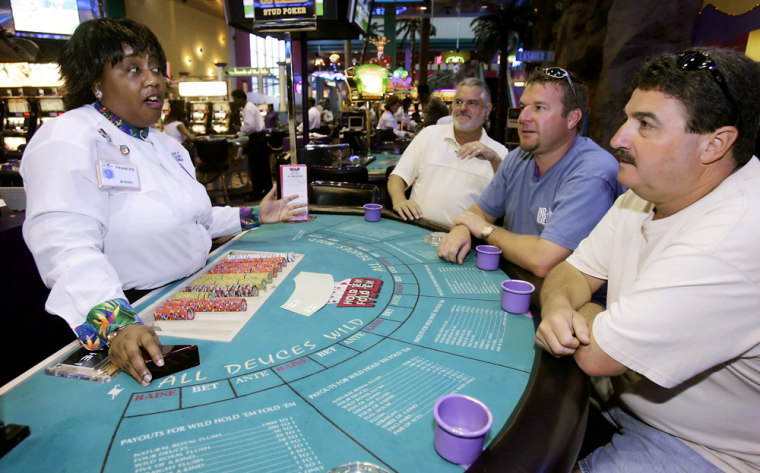The worldwide poker industry appears to have hit every possible inside straight, long-shot flush and unlikely full house that it could, accumulating a large pot of cash in the process.
But as the holiday season nears an end, the industry’s luck seems to be running out as boxed sets of cards and chips are discounted, ratings fade for some poker-themed television shows and shares of a poker-linked stock slump.
From televised celebrity poker tournaments to Internet gambling sites, from thronged tables at Las Vegas casinos to a weekly column in The New York Times, poker has grown into a national obsession.
Industry group American Gaming Association found the level of interest in poker rose significantly in 2004, with casinos and New Jersey and Nevada generating $152 million in revenue off the game, up 45 percent over the previous year. The two states are the only ones that track poker revenue specifically.
Yet there are signs interest is waning among some of the demographic groups who fueled the craze.
“It is a pop fad,” said Bill Thompson, author and professor of public administration at the University of Nevada, Las Vegas. “Fads pass.”
Poker sets, once displayed prominently at his local Walgreen Co. store, have been moved further back into the store, he said.
“It may be reducing down to the niche market, which would be people in their 20s, macho-man type of people,” he said. “Parents aren’t looking to buy little sets.”
In the last few Christmas seasons, stores like Toys "R" Us did a booming business in poker chips, said Sean McGowan, an analyst at Harris Nesbit. But now chains like Target Corp. and Wal-Mart Stores Inc. are deeply discounting the sets to move them off the shelves.
“The people who are obviously most interested in it obviously went out and did it already,” McGowan said, noting that his own school-age son, who once obsessively played, has cooled on the game. “He doesn’t even talk about it.”
Ratings for poker shows and tournaments, which mainstream sports networks like ESPN rushed to televise in recent years, are no longer growing as quickly.
“As far as we can tell, the big poker rooms have continued to grow, but global ratings for poker telecasts around the world have been seeing retrenchment,” said Eugene Christiansen, chief executive of Christiansen Capital Advisors. “The future is not going to be like the past year at all.”
Steven Lipscomb, chief executive of gaming entertainment group WPT Enterprises Inc., which owns the still-popular World Poker Tour television show, said the poker market was “still bubbling.”
“We are in what I believe to be the early stages of a very long growth curve,” he said. “If we were to be on the same growth scale that we were in ... we would be doing NFL-type numbers. And I don’t think our expectations are that we will have 20 million people tuning in.”
Some investors who rushed to capitalize on the poker craze have gotten burned.
Shares in WPT have lost more than 50 percent this year after briefly surging in July when U.S. poker champion Doyle Brunson made an unsolicited $700 million offer to buy the company.
The bid, which later expired, is under investigation by the Securities and Exchange Commission.
“These cult fad stocks always end up in disaster,” said Ivan Feinseth of New York-based advisory firm Matrix USA, noting that the company loses money and calling the stock overvalued despite rapid revenue growth.
Unlike England, where several online gaming stocks are listed, poker has not blossomed as an area for investors in the United States, where Internet gambling remains illegal.
Christiansen said telecommunication companies based in the United States had not bought into poker rooms either because of the legal issues.
He said interest in televised poker — an important factor in the growth of the game —continued to increase globally, although at a slower pace and at different rates in different countries.
“Nothing can grow to the sky,” he said.
